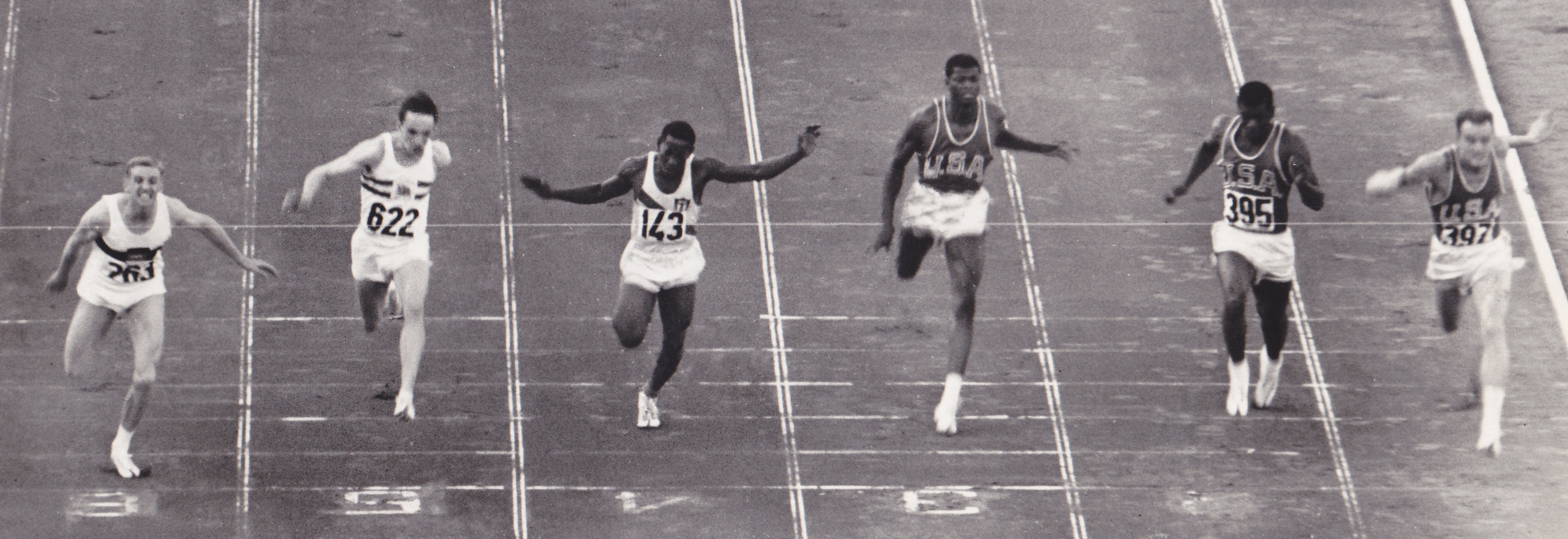1. Early life and athletic beginnings
Enrique Figuerola Camue was born on July 15, 1938, in Santiago de Cuba, Cuba. Details regarding his early upbringing and his initial engagement in sports are not extensively documented, but his path ultimately led him to track and field, where he developed into a formidable sprinter.
2. Major athletic achievements
Enrique Figuerola's athletic career was marked by consistent high-level performances in major international competitions, culminating in multiple Olympic and international medals.
2.1. Olympic Games
Figuerola participated in three consecutive Olympic Games, making a notable impact in each appearance.

His first Olympic appearance was at the 1960 Summer Olympics in Rome, Italy. Competing in the men's 100 metres event, Figuerola successfully advanced to the final, where he finished in fourth place. This strong debut showcased his potential on the world stage.
Four years later, at the 1964 Summer Olympics in Tokyo, Japan, Figuerola achieved his first Olympic medal. In the highly anticipated men's 100 metres final, he secured the silver medal with a time of 10.2 seconds. He finished behind American sprinter Robert Hayes, who won the gold medal, and ahead of Canadian athlete Harry Jerome, who earned the bronze.

Figuerola's final Olympic participation came at the 1968 Summer Olympics in Mexico City, Mexico. This time, he added another silver medal to his collection as part of the Cuban 4×100 metres relay team. Running alongside his teammates Hermes Ramirez, Juan Morales, and Pablo Montes, the Cuban quartet finished second with a time of 38.40 seconds, placing behind the gold-medalist United States team and ahead of France, which took the bronze.
2.2. Other international competitions
Beyond the Olympic Games, Enrique Figuerola demonstrated his sprinting prowess at various other significant international events, consistently earning medals and establishing himself as a dominant force in the Western Hemisphere.
At the 1959 Pan American Games held in Chicago, United States, Figuerola earned a bronze medal in the 100 metres event, clocking a time of 10.5 seconds. This marked one of his earliest international medal successes.
His performance peaked at the 1963 Pan American Games in São Paulo, Brazil, where he captured the gold medal in the 100 metres with a winning time of 10.46 seconds. This victory solidified his status as one of the top sprinters in the Americas. He also earned a gold medal at the 1966 Central American and Caribbean Games in San Juan, Puerto Rico, once again in the 100 metres event.
Figuerola also excelled in university-level international competitions. At the 1961 Summer Universiade in Sofia, Bulgaria, he claimed the gold medal in the 100 metres, recording a time of 10.38 seconds. He repeated this success at the 1963 Summer Universiade in Porto Alegre, Brazil, where he again won the 100 metres gold medal with a time of 10.34 seconds.
3. Career statistics and results
Throughout his career, Enrique Figuerola competed in numerous major international championships, consistently delivering strong performances. The table below summarizes his principal results:
| Year | Competition | Location | Event | Result | Time |
|---|---|---|---|---|---|
| 1959 | Pan American Games | Chicago, United States | 100m | 3rd | 10.5 s |
| 1961 | Summer Universiade | Sofia, Bulgaria | 100m | 1st | 10.38 s |
| 1963 | Pan American Games | São Paulo, Brazil | 100m | 1st | 10.46 s |
| 1963 | Summer Universiade | Porto Alegre, Brazil | 100m | 1st | 10.34 s |
| 1964 | 1964 Summer Olympics | Tokyo, Japan | 100m | 2nd | 10.2 s |
| 1968 | 1968 Summer Olympics | Mexico City, Mexico | 4×100m relay | 2nd | 38.40 s |
4. Legacy
Enrique Figuerola's distinguished athletic career left a significant legacy in Cuban sports. His consistent medal-winning performances at the Olympic Games, Pan American Games, and Universiade brought international recognition to Cuban athletics and inspired many aspiring athletes within the country. As one of Cuba's pioneering sprinters to achieve global prominence, Figuerola played a crucial role in establishing Cuba's reputation as a strong competitor in track and field events. His achievements contributed to a sense of national pride and demonstrated the potential for athletic excellence fostered within the Cuban system, making him a celebrated figure in the nation's sporting history.